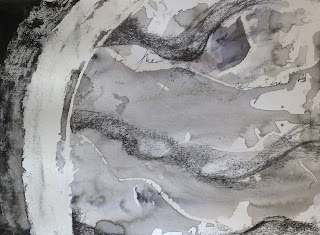the desire for absence
to be not
to circle the gaps of the unknown "no"
[For full chapter, click here
This chapter is dominated by the same key words as the previous one: k'r'v-- close, within; and d'r'sh, to investigate, analyze; d'v'r--thing, saying. It too focuses on to'eva--usually loosely translated as "abomination"; it too places it in opposition to tamim --pure, without blemish.
Thematically, the two chapters are related as well, as here we further define the relationship of center to periphery and the space "within". The "chosen" (18:5) tribe of Levi is intimately linked to the place that "God will choose," and so cannot have "an inheritance amongst / within [k'r'v] his brother" (18:2)--he cannot truly be part of the space between the periphery and the center. Coming into the land will bring a to a new leadership that will come from among (k'r'v) the people: "I will raise them a prophet from amongs (k'r'v) their brothers, like you [Moses]". This leadership will draw directly from Sinai, the place where all the nation "heard the Lord."
Yet rhetorically, this chapter is dominated by the negative: it opens with a sonorous "no": "lo yihiye--there shall not be." This negative is balanced by the positive "ze yihiye--this shall be" in the next subsection, but the negative floods once again at the closing, with the return to Sinai. The prophet who will come to replace Moses will come to preserve "not": "let me not hear again the voice of God" "let me not see this great fire." Too much Presence leads to complete absence: "so I not die."
The coming prophet will straddle the line between the known and unknown, between yes and no: "the prophet who will speak in My name that which I have not commanded, that prophet shall die.... that which the prophet spoke in the name of God and was not (lo yihiye) and will not come (lo yavo), that is the thing which God has not spoken..." Hu ha-davar asher lo davro--that is the thing that God has not--the negative here gains a positive presence, becomes an actual davar, thing, object, speech act.]







